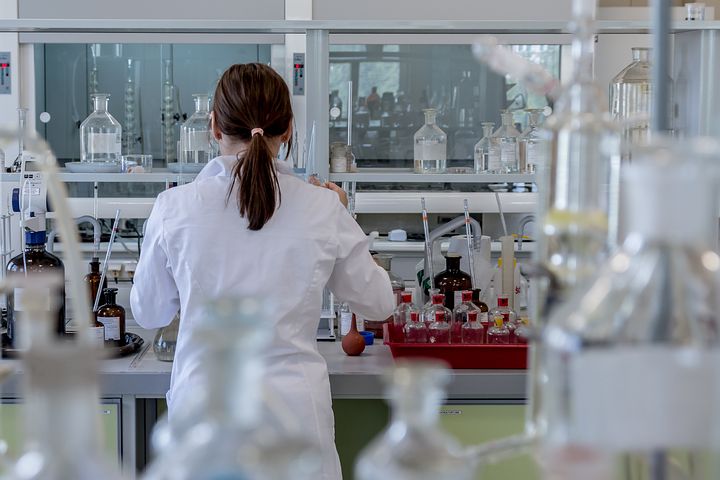
| Chemist Key Stats | |
|---|---|
| Education | 4+ Years |
| Job Outlook | 6.5% |
A chemist is a scientist who is an expert in chemicals, molecules, and matter.
If you enjoy chemistry, have strong academic skills, and would like to work in a research setting then you might like to become a chemist.
All materials and substances around us are made up of different chemicals.
Through studying, testing, and research, chemists find better ways to use these chemicals through understanding them better.
Some chemists work on products that we buy and use.
Others look at improving drugs and medicines.
Some use chemistry to study the environment and world around us.
Table of Contents
Education Requirements to Become a Chemist
If you’re in high school and want to become a chemist, you should concentrate on getting good grades in chemistry, as well as other science-based subjects.
Computer modeling is another skill which may help later on.
If you enjoy lab work and experiments, you will enjoy being a chemist.
The minimum requirement to work as a chemist is a four year bachelor’s degree with a major in chemistry.
To make sure that the college you choose is fully accredited, take a look at the American Chemical Society website.
Elective subjects should include physics, mathematics, and computer science.
Developing strong computer literacy while at high school and college is really important.
This is a key skill that potential employers will be looking for.
If you feel like you need help in this area, enroll in a short course or take a couple of night classes.
With a bachelor’s degree, you will be qualified to work in quality control and testing as a chemist, or as an assistant to a more qualified chemist.
Many research jobs will require you to complete a master’s or doctorate in chemistry.
A master’s degree takes one to two years of study, while a doctorate takes three to four.
Chemist Job Description
When you become a chemist, there are many different areas of this field you could choose to work in.
Here are some of the niche areas:
Organic Chemist – study the carbon compounds that are found in all living things.
Physical and Theoretical Chemist – study the theory of matter, and the makeup of atoms and molecules.
Materials Chemist – use chemistry to improve current products or develop new ones.
Most chemists work within the sub sector.
Many chemists also work as teachers, at either the high school or college level.
Most chemists work in a laboratory, or in an office.
They may work developing new products, conducting original research, or putting together complex theories.
Here are some of the tasks a chemist might be responsible for:
- Conducting research
- Collecting data
- Improving and developing products
- Gathering samples
- Completing lab work
Chemist Salary and Career Path
Working as a chemist, it’s like you’ll being as a research assistant, or working in quality control.
With experience and postgraduate qualifications, you can move on to more involved research projects and product development.
Experienced chemists may move on to managerial roles, such as natural science managers.
In the past, many chemists have worked in the chemical manufacture industry; however these jobs are now in decline.
Better opportunities are found in areas like biotechnology and pharmaceutical research.
Strong job growth is not predicted for chemists in the coming years.
About one quarter of all qualified chemists work in the education industry, as teachers in either high school or college settings.
The median salary for a chemist is $66,000 a year.
The top 10% earners make over $109,000 a year.
The highest paying employers were colleges, where chemists worked as professors, or small firms where chemists worked in product development.
Some similar jobs to that of a chemist include:
If you’re looking for a research based career that offers plenty of options and variety, then you might like to become a chemist.
The work is interesting, and there are many varied fields to enter.
The high paying jobs require a postgraduate education, but also offer a more challenging work environment and a higher salary.
There is also the option to gain a higher degree later in a career, and other opportunities for professional development.
![]() The below information is based on the 2023 BLS national averages.
The below information is based on the 2023 BLS national averages.
National Average Salary
$95,560Average Salary by State
| State | Avg. Annual Salary |
|---|---|
| Alabama | $90,130 |
| Alaska | $91,740 |
| Arizona | $79,840 |
| Arkansas | $81,780 |
| California | $105,560 |
| Colorado | $100,500 |
| Connecticut | $100,430 |
| Delaware | $118,130 |
| District of Columbia | $139,600 |
| Florida | $80,050 |
| Georgia | $95,360 |
| Hawaii | $86,240 |
| Idaho | $75,290 |
| Illinois | $92,590 |
| Indiana | $81,370 |
| Iowa | $86,010 |
| Kansas | $83,520 |
| Kentucky | $82,110 |
| Louisiana | $102,120 |
| Maine | $64,720 |
| Maryland | $124,550 |
| Massachusetts | $116,980 |
| Michigan | $97,410 |
| Minnesota | $88,920 |
| Mississippi | $86,360 |
| Missouri | $99,370 |
| Montana | $72,390 |
| Nebraska | $78,780 |
| Nevada | $64,530 |
| New Hampshire | $84,660 |
| New Jersey | $99,860 |
| New Mexico | $103,500 |
| New York | $94,170 |
| North Carolina | $86,920 |
| North Dakota | $87,140 |
| Ohio | $87,770 |
| Oklahoma | $74,910 |
| Oregon | $84,710 |
| Pennsylvania | $82,250 |
| Rhode Island | $93,620 |
| South Carolina | $82,920 |
| South Dakota | $68,470 |
| Tennessee | $87,220 |
| Texas | $100,150 |
| Utah | $80,800 |
| Vermont | $92,300 |
| Virginia | $98,460 |
| Washington | $95,070 |
| West Virginia | $84,420 |
| Wisconsin | $76,690 |
| Wyoming | $88,220 |
| Puerto Rico | $70,820 |
The top earning state in the field is District of Columbia, where the average salary is $139,600.
These are the top 5 highest-paying states in the field:
* Employment conditions in your area may vary.
Frequently Asked Questions
What does a chemist do?
Chemists are scientists who research chemical substances, perform various experiments, and study inter-chemical reactions.
In most cases, a chemist is part of a large research team and is responsible for improving the quality of established chemical products, for example.
Chemistry has a few sub-disciplines and scientists usually specialize in one of them – biochemistry, nuclear chemistry, theoretical chemistry, and neurochemistry.
The typical duties of a chemist include analyzing substances and creating data; creating new substances; developing formulations in the lab; measuring physical properties of substances; helping solve quality issues and troubleshoot manufacturing issues; developing new products and improving existing products; writing technical papers and reports, and so on.
Chemists work in laboratories and other controlled environments with different types of scientific equipment.
How much do chemists make?
On average, a chemist can make a little more than $72.000 per year in the United States.
In case you decide to follow this career path, you can expect to earn anywhere between $41.000 and $127.000 annually.
The salary would certainly depend on a variety of factors – your education and experience level, the employer, the location and so on.
The chemists that work in Maryland, Delaware, and the District of Columbia, for example, have the highest average salaries.
An entry-level chemist can earn $20 per hour, while a specialist with plenty of experience will make $61 and more.
How much does it cost to become a chemist?
You would certainly need at least a bachelor’s degree in chemistry or a related field, in order to become a chemist.
A year in a university can cost you anywhere between $8.000 and $45.000 (and more); the cost depends on a variety of factors (the books, supplies, and accommodation expenses are not included).
However, the advanced positions would require you to have a master’s degree (over $11.000) or a doctorate degree, in case you want to become a professor or focus on independent research in chemistry (a Ph.D. will cost you around $20.000 per year).
What is the demand for chemists?
Between 2016 and 2026, the molecular biologist job market is expected to grow by 6.5%, according to the Bureau of Labor Statistics.
That is pretty much as fast as the national average for all occupations in the United States.
Additional job opportunities are being created within pharmaceutical and biotechnology firms and government agencies (the U.S. Food and Drug Administration, for example).
The industry is mainly concentrated in Texas, California, and New Jersey.
How long does it take to become a chemist?
It will take you 4 years to obtain a bachelor’s degree and another 2 years to earn a master’s degree.
A doctorate degree typically takes 4-6 years to acquire.
Laboratory experience is incredibly important for aspiring chemists; you might want to consider seeking internships with prospective employers as well.
Bear in mind that nowadays a chemist should possess strong competence in computer science.













